
It’s not everyday that we review software around here, but the folks at Adafruit recently put together an iOS app that I figured might be of interest. Their iPad/iPhone compatible application is called “Circuit Playground”, and it includes all sorts of handy electronics reference tools. For the context of this review, it should be noted that I paid for the application myself, and that I have had no communication with the Adafruit team regarding my assessment of the app.
As you can see from the main screen, the app currently features eight different tools, not counting the “Deals @ Adafruit” entry, since I consider that to be more of a marketing strategy than a real tool. The rest of the items are pretty standard reference fare, in an easy to use and understand package.
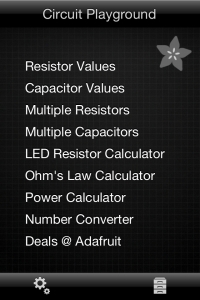
The Resistor Value tool is pretty straightforward, allowing you to specify resistance in two ways. You can select the color bands of your resistor and view the resulting value, or enter the resistance to see what color resistor you should be looking for. It supports both 4 and 5 band resistors as you would expect, and features a simple “Instruction Page” (as do all the tools), accessible via the small information icon on the bottom left corner of the screen. One thing I would love to see implemented is the ability to photograph components and display their resistance. I think it would be a very helpful addition for makers whose eyesight isn’t what it used to be.
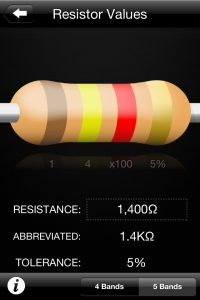
The Multiple Resistor and Multiple Capacitor tools are similar in function, showing you the resultant resistance/capacitance of various series and parallel component setups. They both support up to 9 items apiece, and let you select the capacitance and resistance values for each component one at a time. This is both good and bad, as it gets pretty tedious entering each value manually after a bit. One other item that I thought could use improvement here was the functionality of switching between series and parallel configurations or adding/removing components. Any time a change is made to the configuration, all of the values are reset – this means that if you add another resistor to your 8-resistor diagram, you must re-enter each and every value.
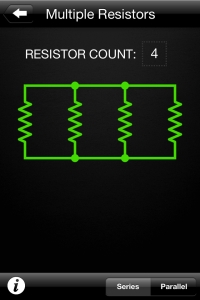
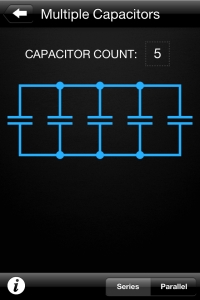
The LED Resistor Calculator does exactly as its name suggests, much like many online calculators that have come before it. This handy feature lets you pick your LED color from a pre-determined list, populating the forward voltage and current fields automatically, based on some common/standard values. Once you specify a supply voltage and quantity of LEDs, the application returns the exact resistance required to meet your specs, along with the value of the nearest standard resistor. While the tool is certainly helpful when calculating resistors for LEDs in series, it lacks any sort of ability to do the same for parallel configurations. If the folks at Adafruit included that functionality along with the ability to customize the default LED list, I would be thrilled. I do have to point out however, that this tool does retain the LED count and supply voltage when changing LED colors, which is something I was glad to see after playing around with the Multiple Resistor tool.
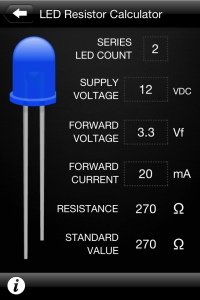
The Ohm’s Law calculator is a simple tool that is great for allowing me to carry out quick sanity checks of the math I have done in my head. Simply enter two values in the triangle, and Circuit Playground spits out the third. The Power Calculator is a similarly straightforward tool, which takes in two of four values (Power, Voltage, Current, Resistance), calculating the rest for you. Neither tool is overly complicated, but then again they don’t need to be.
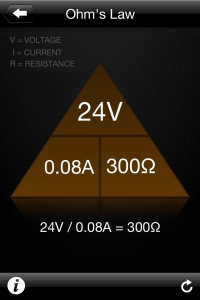
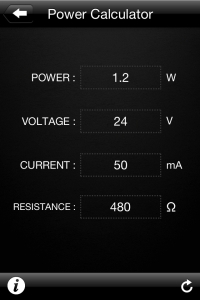
The final calculator that the app provides makes number conversions dead simple. Given one number, the converter will give you its representation in binary, decimal, hexadecimal, octal, and ASCII notation. While it might not be something that I’ll use every day, it certainly is a very helpful reference tool. I personally think that this tool would benefit from the ability to convert strings of characters/numbers rather than one at a time, but perhaps that is something they are looking to add in a forthcoming release.
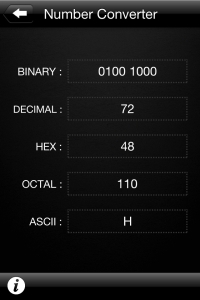
One of Circuit Playground’s features that is not as prominent as the others on the main menu is the built-in datasheet viewer. It uses a lightweight interface to help search through and view PDF files located in the iPhone’s document store. I don’t have anything of the sort stored on my phone so I can’t truly test this portion of the app – let us know in the comments how it works for you.

A few data persistence nitpicks aside, I think that Circuit Playground is a solid app with a lot of potential. At $2.99 it sits at the higher end of the App Store pricing structure, so whether or not these tools are worth it is ultimately up to you. Adafruit does say that anyone who purchases the app gets $3 off their next order in their online store, which essentially makes the app free if you are a regular customer.
While it’s not designed for your seasoned Electrical Engineer, it is definitely a great resource for the part-time tinkerers out there. At the moment, it is an iOS-only offering, but Adafruit says that they will be releasing an Android version at some point in the future. In the meantime, they suggest giving ElectroDroid a try, as it is currently the best app on that platform.















See also Electrodroid for Android :)
It features popular pinouts too and is free.
As well as ElectroDroid, Android also has EveryCircuit, which is an amazing application.
I use it on my pitiful little HTC Wildfire for simulating all sorts of circuits before I commit to rea-life testing.
this is an AWESOME review, thank you hack-a-day team! this is very helpful for the adafruit team working on the first update that will be pushed out soon!
oh, if you’re android check out electrodroid and support the developer with the donation-version!
I look forward to seeing what the first update brings – I hope that we’ll be seeing some of the tools found in other apps (and more) as time goes on.
As for that kickback money, you guys can feel free to send it our way at any point. I figure we might as well indulge the wild “advertising” conspiracy theories that seem to be thrown around any time we mention Adafruit or the Arduino here on Hack a Day!
Well basically this simply IS another instance of Adafruit’s “hey look, we offer you something we saw someone else do for free, but we feel like charging you for it”. Do they actually do anything else? This is not being snappy, i’m totally serious. Written using Android.
I wonder since when you are making advertisements for adafruits or anyone else with such impressive feature articles..
Sweet. I’ve had this app built into my brain for a while now, although it does come with stylus support and occasionally requires a pad/post-it note.
but this looks good if your the type that can’t access it normally because of current multitasking and thought processing.
^_^ besides what ever happened to calling stuff programs?
What happened to the jump break? Kinda long for the homepage.
Does this mean that the “Circuit Sidekick” app won’t receive updates any longer?
http://itunes.apple.com/us/app/elektor-electronic-toolbox/id339158729?mt=8
Same idea, much more complete.
+1
The Elektor app is a can’t live without app for me.
I’m sorry but I don’t like this. Just because you put adafruit on it it’s better? this time not I fear. All of the presented software here is already available for free and on both Iphones and Androids.
As an open source fan,I’d rather pay 2bucks for supporting the software than buying the software itself,I find it greedy. also,this is clearly a product and it aims to get profit from the name of Adafruit itself but providing nicer graphics and stuff,yeah right.
The intent is clear,profit,which I don’t like. Asking for donation is yes,less efficient but way more morally acceptable from a open-source point of view.
Now for what my group use mainly (Android) :
Iris for quick random question,
ElectroDroid for reference
pinout for ,pinout ;p
That’s all you basicly need. If you want more,I’m pretty sure someone will port any of the good software we have to linux then to android tabs soon.
Thank you!
Your problem with profit has nothing to do with open-source philosophy. An argument against providing software on a closed platform (iPhone/iPad) would be more appropriate if you have a problem with the software. I see nothing wrong with supporting development through a purchase of software if you get the code with the purchase. Open-source doesn’t mean free as in beer.
You would think at least OS advocates would know the difference between Free software and free software, but apparently not.
It will be an interesting test of how sincere Adafruit’s commitment to Open Source is.
PS: I’m not bothered by the price, everyone can spare $3 for something that’s actually useful
True.
PS: adding a feature like visual detection of resistors as discussed before on this very site would be an interesting concept and I thought that lady ada did succeed that task when I first saw the post…
please, for the love of god, dont put ever, put ads that long on this page ever again.
This is an elite site for tech gurrus, not an adverising forum for you to sling addafruit products.
You’re new here, right? :)
“This is an elite site for tech gurrus”
oh mercy… after the day i’ve had, i really needed that laugh, thxsomuch!
Yep, because all us techies are iPhone users… I’d venture to guess most of the people reading hackaday are android users, just saying. Also, why the long article on the homepage?
Long live the awesome and free Electrodroid app!
The long article was an accident. I’d like to run a full review of electroid next. I didn’t even know about it!
I’d like to see that! it’s simple,efficient and free. also,I got a shhhload of usefull tech apps loaded in my rooted galaxy s. If you’re not up to date on that matter,I’d be pleased to boost you up kind sir.
glad to hear it was an honest mistake.
Electrodroid is the best(and free), surprised it hasn’t been featured on her(maybe it has, and I just haven’t seen it). I can’t decide whether to buy the paid version of EveryCircuit or of DroidTesla(both are 10 bucks,EveryCircuit is easier to use, but Droid Tesla has more features).
I really like electrodroid, only thing I would add is a tool to convert between numeric capacitor code and actual values. For example, you put “104” and it shows as “0.1uF” or you put “0.1uF” and it shows as “104”. There is a free app for this in windows called “calcucap”.
I don’t see a converter per se, but in the Resources section there is a ‘Capacitor Marking Codes’ reference sheet with a table.
nice apps … but isn´t there a website with all this stuff? like LED resistor calculator etc. ?
Jeez all this stuff should fit in your head if you’re doing electronics regularly. Stop contracting out brain work to apps and exercise your neurons a bit :-)
Another vote for electroid. Stop putting money in the pockets of those that don’t need it. Namely those that continuously try to commodify hacking under the guise of happy tree friends and send us junk with separating circuit traces. Never again.
Stupid me, I just printed out sheets and tacked them to my wall. Got a craptop with a nice big display on the bench for the random pinout. My tinkering buddy showed me electroid and I thought it was about the right level of sophistication for me, but old habits and so forth… Also with Chris Smith on this one in the sense that all that pinching and dragging takes longer than straight up punching it in sometimes.
hi @blue carbuncle – if you look at our circuit playground page we link to electroid, we hope you support the developer and buy the donation-ware version, it’s android only.
our app is $2.99 and we give you a $2.99 coupon at adafruit, we think that’s a pretty good deal.
as far as “junk with separating circuit traces” we’ve never had a customer with a problem like that – but if you do, email me support@adafruit.com and i’ll take care of replacement / refund immediately.
$130.00 for an AVR, buncha circuits stuffed into a dollar tree fishing kit, and things with screens in static bags with no air packing or cushion whatsoever? It looked like something I would do at 3am drunk after watching fett’s vette for the 34th time and put in the box. Adafruit was a whole ‘nother thing over a year ago, but nice to see you protecting your interests and I appreciate the offer for the app for the smartphone I don’t have (my tinkering friend) but yeah, I still has the butthurts from both of those experiences. silly me. Here I wasn’t going to even bring all that up, just hint at it.
“is this the untimely end of millhouse”
@blue carbuncle – you’re welcome to email us directly at support@adafruit.com for any assistance with any product, past or present. we’ll make sure it’s resolved to your satisfaction!
Thanks pt :) Sorry for the outbursty response, it’s kinda just done. It’s all sorted and we got a couple of projects done before I had to go, so I’m confident he’ll keep tinkering. I guess maybe he’ll be submitting projects to HaD in a couple of years (he’s 10 lol) so keep an eye out for Nate :)
Thanks for the interest and I apologize for the tone of my response yesterday. I talked to his dad last night and Nate’s still tinkering, so it’s a mission accomplished in the end. I guess I would suggest that there could be better use of the packaging space involved and would be easy enough to label some things, which may be helpful for others (ya know how one resistor’s red is another’s brown lol) ;)
Thanks :)
Despite the negativity, I think this article was a great idea. Not only did it introduce us to this tool from Adafruit, it also brought out a list of others that many of us had never seen.
I also second the nomination for the identification of resistor values through photography. It would be extremely beneficial for those who are color-blind.